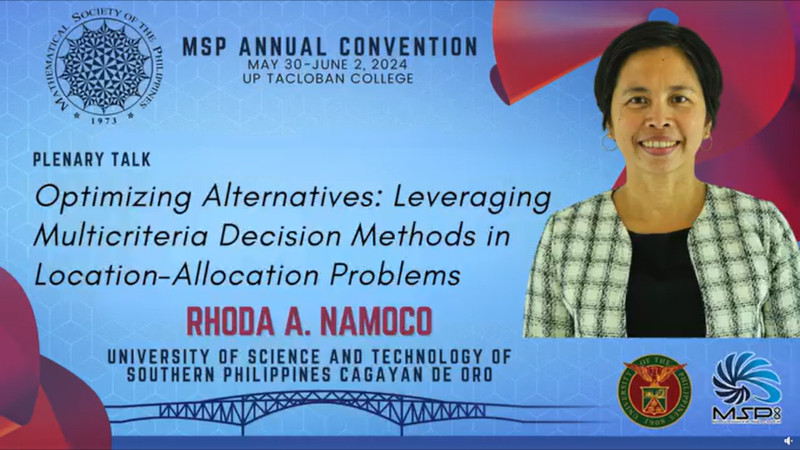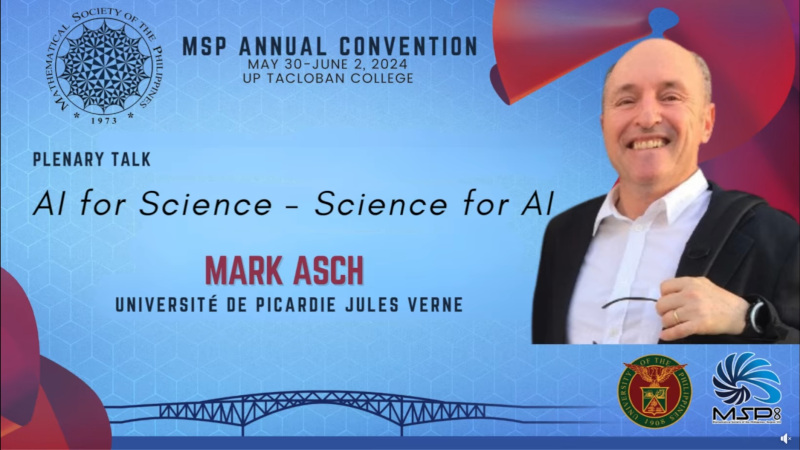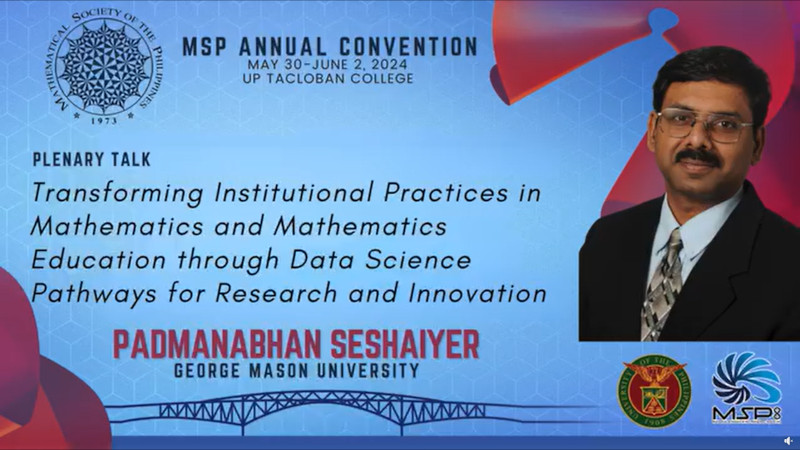
MSP ANNUAL CONVENTION
PLENARY SPEAKER
Dr. Debbie Marie B. Verzosa
University of Southern Mindanao
Title: How Can Mathematicians Contribute to Mathematics Education in Schools?
Bionote: Debbie Marie B. Verzosa is a Professor in the Department of Mathematics and Statistics of University of Southern Mindanao where she is currently designated as the Vice President for Research, Development, and Extension. She earned her Bachelor's and Master's Degrees in Mathematics from Ateneo de Manila University, and her PhD in Education from Macquarie University, Sydney. She has served as the president of the Philippine Council for Mathematics Teacher Educators (MATHTED), Inc. for four years, ending in May 2024. Her scholarly publications include various areas of mathematics education, including the mathematics teaching profession, technology, ethnomathematics, and social justice.

MSP ANNUAL CONVENTION
PLENARY SPEAKER
Dr. Jose Ramon G. Albert
Philippine Institute for Development Studies
Title: Sustainable Development Goal 4 on Quality Education for All: How Does the Philippines Fare and What Needs to Be Done?
Abstract: The Philippines has made progress towards achieving SDG 4 on quality education and lifelong learning, with nearly universal primary enrollment and increased secondary participation. However, challenges remain, including high dropout rates, subpar learning outcomes, limited access for disadvantaged children to early childhood development and pre-primary education, and the need to improve the quality and relevance of technical, vocational, and higher education programs. The talk shows more details on statistics on these education outcomes, and provides recommendations addressing learning deficits, implementing an open data policy, refining teacher training, and developing a comprehensive strategy with integrated planning among government agencies to ensure inclusive quality education for all by 2030.
Bionote: Dr. Jose Ramon Albert, “Toots” to his family and friends, is a professional statistician and senior research fellow of the Philippine Institute for Development Studies. He finished BS Applied Math summa cum laude in 1988 from De La Salle University; MS in Statistics in 1989 and PhD in Statistics in 1983 from the State University of New York at Stony Brook. From Sep 2012 to Feb 2014, he was seconded to the now defunct National Statistical Coordination Board, to head it as its Secretary General before it was consolidated with other major statistical agencies into the Philippine Statistics Authority. Dr. Albert has served as consultant to various government agencies, private firms in the Philippines and international organizations. In the past two decades, he has worked for 29 countries spanning South-East Asia, South Asia, East Asia, the Pacific, the Americas and the Caribbean, the Middle East, and Africa on poverty diagnostics, econometric methods, and survey data analysis. Dr. Albert has taught at various higher education institutions in the Philippines, and has written extensively on poverty, the middle class and income distribution, social protection, education, gender, social inclusion, ICT, innovation, and other development issues.

MSP ANNUAL CONVENTION
PLENARY SPEAKER
Dr. Rhoda A. Namoco
Title: Optimizing Alternatives: Leveraging Multicriteria Decision Methods in Location-Allocation Problems
Abstract: Location-allocation problems (LAPs) are prevalent in various domains, requiring strategic placement of facilities to meet demand while minimizing costs or maximizing efficiency. LAPs can vary in complexity, from simple single-facility scenarios to complex multi-facility problems with multiple objectives and constraints. Multicriteria decision methods (MCDM) provide invaluable tools to address these challenges. This talk explores the broad applicability of MCDM in addressing LAPs across different sectors. By navigating complex trade-offs, MCDM empowers decision-makers to enhance accessibility, efficiency, and equity in providing services, while also optimizing resource allocation and service delivery. Using real-world examples, we will demonstrate how MCDM can be effectively utilized to address LAPs, enabling decision-makers to consider diverse factors when determining optimal facility locations.
Bionote: Dr. Rhoda A. Namoco is a Professor of Applied Mathematics at the University of Science and Technology of Southern Philippines (USTP) in Cagayan de Oro City. Her research focuses on optimization and multi-criteria decision-making. Currently, Dr. Namoco is a member of the PASYENTE Project for Dengue, a research initiative funded by DOST-PCHRD, aimed at developing patient-centered clinical decision support systems utilizing artificial intelligence technology and operations research to enhance healthcare outcomes.

MSP ANNUAL CONVENTION
PLENARY SPEAKER
Dr. Romar dela Cruz
University of the Philippines Diliman
Title: Minimal codewords in linear codes
Abstract: A minimal codeword is a nonzero vector whose support, i.e., the set of nonzero coordinates, does not properly contain the support of another nonzero codeword. Minimal codewords have applications in decoding linear codes and in cryptography. In this talk, we discuss two approaches in the study of the number of minimal codewords (given the length and dimension of linear codes). The first approach uses systematic generator matrices, and we present results on the maximum number of minimal codewords. The second approach involves techniques from projective geometry. This leads to some results on the minimum number of minimal codewords.
Bionote: Romar dela Cruz is an associate professor at the Institute of Mathematics, University of the Philippines Diliman. He received his BS and MS degrees in Mathematics from UP Diliman. In 2013, he obtained his PhD degree in Mathematical Sciences from Nanyang Technological University, Singapore. He is a recipient of the Georg Forster Research Fellowship (2019-2020) from the Alexander von Humboldt Foundation. His research interests include coding theory and cryptography.

MSP ANNUAL CONVENTION
PLENARY SPEAKER
Dr. Gary Greaves
Nanyang Technological University
Title: How to design a graph with three eigenvalues
Abstract: Graphs with three distinct eigenvalues are fundamental objects of study in spectral graph theory. The most well-known examples are strongly regular graphs. In 1995, Willem Haemers posed a question at the 15th British Combinatorial Conference: ``Do there exist any connected graphs having three distinct eigenvalues apart from strongly regular graphs and complete bipartite graphs?"
Muzychuk and Klin initiated the study of a graph with three distinct eigenvalues via its Weisfeiler-Leman closure. They classified such graphs whose Weisfeiler-Leman closure has rank at most 7. In this talk, I will provide a brief overview of the history of non-regular graphs with three distinct eigenvalues, as well as present our recent results on such graphs whose Weisfeiler-Leman closure has a small rank. Our results include the discovery of a new non-regular graph with three distinct eigenvalues obtained from a quasi-symmetric design and a new conjecturally infinite family of non-regular graphs having three distinct eigenvalues obtained by switching Latin square graphs. This talk is based on joint work with Jose Yip.
Bionote: Gary R.W. Greaves earned his PhD from the University of London in 2012. After which, he was awarded a JSPS Postdoctoral fellowship to work with Professor Akihiro Munemasa at Tohoku University in Japan. Subsequently, Greaves became an Assistant Professor at Tohoku University. Greaves joined the faculty of Nanyang Technological University, Singapore in 2016 and has remained there ever since. He is best known for his contributions to the study of equiangular lines and for the discovery of Neumaier graphs.

MSP ANNUAL CONVENTION
PLENARY SPEAKER
Dr. Mark Asch
Université de Picardie Jules Verne
Title: AI for Science - Science for AI
Abstract: In this general presentation, I will begin by surveying the astonishing progress in the use of AI for scientific research, up to the very recent, spectacular use of generative AI. But how can we scientifically certify these results? This is a critical point, since AI-generated results are being used, more and more, as the basis for decision making - for example, in environmental and medical domains, among others. A second issue is that of ethics and morality when using AI - this requires increasing attention. I will conclude with some recommendations, resulting from my recent research and book.
Bionote: Mark Asch is emeritus professor of Applied Mathematics. He holds a B.S. degree in agronomy, an M.S. degree in applied physics from the Hebrew University of Jerusalem (1984) and M.S. and Ph.D. degrees in mathematics (1990) from the Courant Institute of New York University. He was professor of mathematics until 2023 at the University of Picardy, where he was vice-chancellor for research between 2005 and 2008. After 2 years as scientific officer for HPC and Big Data at CNRS in Paris, and 3 years at the French Ministry of Research as scientific officer for mathematics, computing, data and e-infrastructures, he was on secondment at the French National Research Agency (ANR). He then spent 2 years on secondment in industry, working as scientific advisor to corporate research of Total SA.
His research interests are in acoustics, wave propagation, random media, control theory and the application of control methods and machine learning to inverse problems. He has published over 70 articles and conference proceedings in these domains. His book, “Data Assimilation: Methods, Algorithms and Applications”, was published in 2016 by SIAM, USA. His latest book, "A toolbox for Digital Twins: from model-based to data-driven", SIAM, appeared in 2022.

MSP ANNUAL CONVENTION
PLENARY SPEAKER
Dr. Padmanabhan Seshaiyer
Title: Transforming Institutional Practices in Mathematics and Mathematics Education through Data Science Pathways for Research and Innovation
Abstract: To better prepare students for success in a data-driven world of the 21st century, institutions must transform their practices in mathematics and mathematics education. In this talk, we will share how institutions can leverage research and innovation with data-driven practices and innovative educational frameworks to build student competencies for solving real-world problems. Specifically, we will give examples that involve integrating data science concepts, tools, and methodologies into the mathematics curriculum and educational practices through an interdisciplinary approach; fostering collaboration between mathematicians, mathematics educators and data scientists; implementing project-based learning approaches that allow students to apply mathematical concepts to real-world data analysis that require them to collect, process, visualize, analyze, interpret and predict with data; engaging with industry partners, research institutions, and community organizations to provide authentic learning experiences and; creating supportive environments that celebrate diversity and provide resources and support services to ensure all students have equitable access to data-driven approaches to problem solving.
Bionote: Dr. Padmanabhan Seshaiyer (Padhu) is a Professor and Director at George Mason University (GMU) where he has served in multiple leadership positions including the Associate Dean for Academic Affairs, Director of the STEM Accelerator Program and Director of the Center for Outreach in Mathematics Professional Learning and Educational Technology. During the last decade, he initiated and directed a variety of research, educational and outreach programs including faculty development, post-graduate, graduate and undergraduate research, K-12 outreach, teacher professional development, and enrichment programs, to foster the interest of students and teachers in STEM education at all levels. He works with Ministries of Education, Science and Technology as well as Universities across the globe to help them transform their institutional practices. In April 2019, he was selected as one of the “Figures that Matter” for his contributions to Academia and Society and was awarded an honorary doctorate by Vrije Universiteit Brussels.
